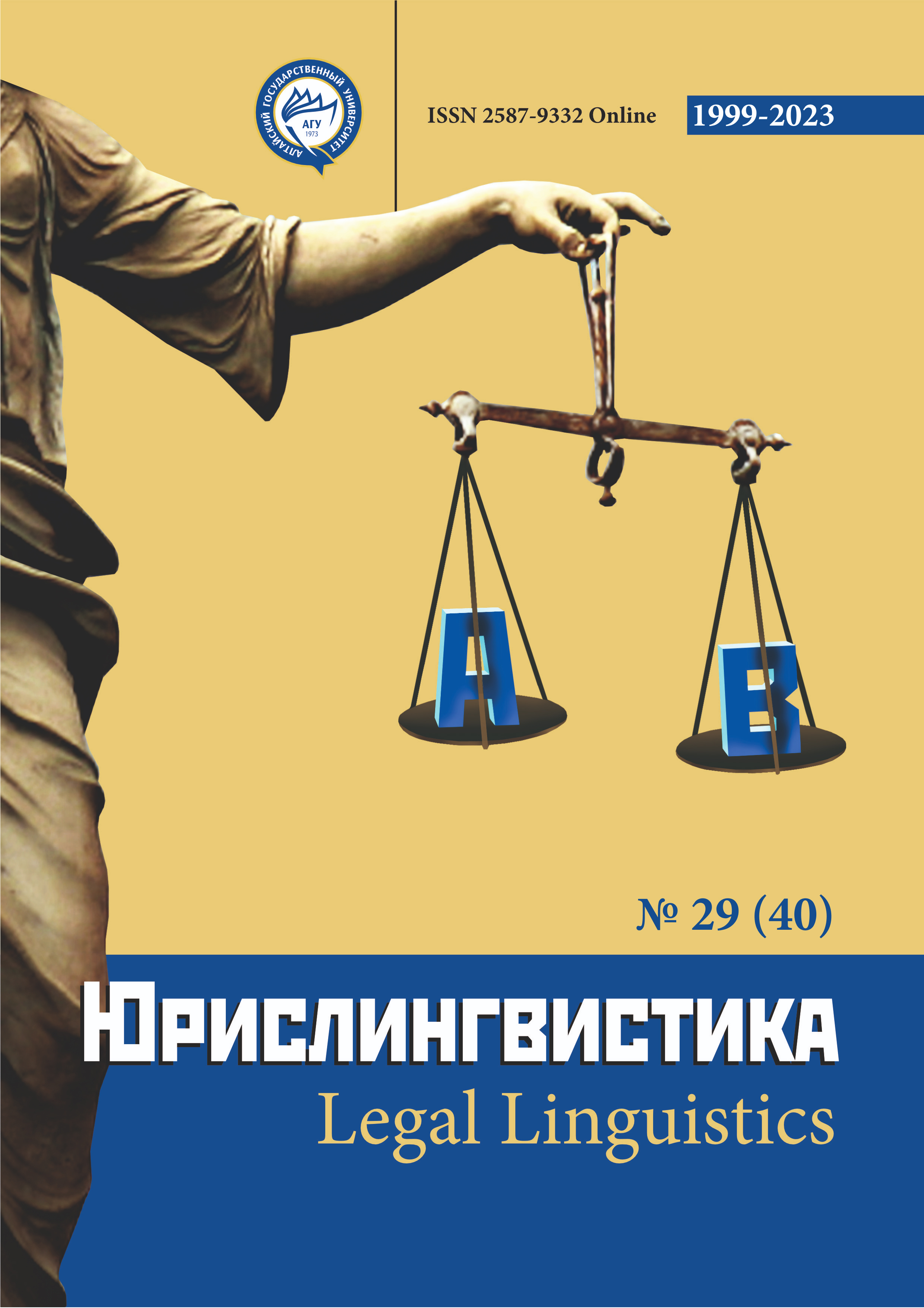History and Current State of the Plain English Concept in Legal Linguistics in English-Speaking Countries
УДК 81.33, ББК 81
Abstract
The article deals with the history and current state of the Plain English concept. The material presented in the article has theoretical and practical value for the development of relevant areas of research related to the Russian language. The subject under discussion is the history and theoretical provisions of the concept of Plain English, as well as an analysis of the potential for the development of the Plain Language concept in future.
The objectives of the study include investigation into the premises and origin of the Plain English concept from both perspectives – legal linguistics and other related fields – as well as the study of the linguistic content of this concept in the paradigm of contemporary research.
The article considers the interrelation between the concepts of Forensic Linguistics, Legal Linguistics, and Judicial Linguistics in American, European, and Russian linguistics, respectively. The authors reveal linguistic and extra-linguistic prerequisites for the formation of the Plain language concept in the USA and European countries in the 20th century. They describe language means of adapting legal texts into plain language texts listed in the analyzed Plain English handbooks and consider some prospects for the development of the concept in the future.
Downloads
Metrics
References
Нечаева Н. В., Хельмле К.-С., Каирова Э. М. Перевод на ясный и простой языки: зарубежный опыт и перспективы в России / Вестник Пермского национального исследовательского политехнического университета: журнал. – 2020. – № 3. – С. 8-24.
Осокина С. А. Концепция «легкого языка» и перспективы ее развития в лингвистике / Филология и человек. – 2022. – №2. – С. 115-133.
A Plain English Handbook. How to create clear SEC disclosure documents. 1998. URL: https://www.sec.gov/pdf/handbook.pdf
Adler М. The Plain Language Movement Get access Arrow / The Oxford Handbook of Language and Law. 2012. URL: https://doi.org/10.1093/oxfordhb/9780199572120.013.0006 Pages 67–83.
Cunningham C. D., Levi J.N., Green G., Kaplan J.P. Plain Meaning and Hard Cases / Yale Law Journal 1994. – V. 103. – no. 6. – P. 1561 –1625. URL: https://www.jstor.org/stable/i232733
Federal Paperwork Reduction. Executive orders. Federal Register Volume 44, Issue 234 (December 4, 1979). Office of the Federal Register, National Archives and Records Administration. Pp. 69609-697332. URL: https://www.govinfo.gov/app/details/FR-1979-12-04
Ferrer C. An Opinion on Pain Language / Official Journal of the European Communities. – 1995. – P. 256/8-256/11. URL: https://eur-lex.europa.eu/legal-content/EN/TXT/PDF/?uri=CELEX:51995IE0797&rid=6
Handbook of Easy Languages in Europe. Eds. C. Lindholm and U. Vanhatalo. Frank & Timme GmbH. Verlag für wissenschaftliche Literatur. Berlin, 2021. URL: https://library.oapen.org/viewer/web/viewer.html?file=/bitstream/handle/20.500.12657/52628/Handbook_of_Easy_Languages_in_Europe.pdf?sequence=12&isAllowed=y
How to write in plain English. 2023. URL: https://www.plainenglish.co.uk/files/howto.pdf
Mouritson S. The Dictionary is Not a Fortress: Definitional Fallacies and a Corpus-Based Approach to Plain Meaning / Brigham Young University Law Review. – 2010. – Pp. 1915-1978.
O’Hayre J. Gobbledygook Has Gotta Go (A style manual that helped inspire the Plain Language movement). Denver, Colorado, 1966. URL: https://www.governmentattic.org/15docs/Gobbledygook_Has_Gotta_Go_1966.pdf
Orwell G. Politics and the English Language. London. Secker and Warburg. 1950. URL: https://www.orwell.ru/library/essays/politics/english/e_polit
Petelin R. Considering Plain Language: Issues and Initiatives, Corporate Communications. An International Journal. – 2010. – no. 15. – P. 205-216. URL: http://dx.doi.org/10.1108/13563281011037964
Pinker S. The Sense of Style: The Thinking Person’s Guide to Writing in the 21st Century. New York, NY: Penguin. 2014. URL: https://stevenpinker.com/publications/sense-style-thinking-persons-guide-writing-21st-century
Plain English Campaign. 2023. URL: http://www.plainenglish.co.uk/about-us/history/timeline.html
Plain Writing Act of 2010 Compliance Reports. URL: https://www.ed.gov/plain-language
Poscher R. Ambiguity And Vagueness In Legal Interpretation Get access Arrow / The Oxford Handbook of Language and Law. – 2012. – P. 128-145. URL: https://doi.org/10.1093/oxfordhb/9780199572120.013.0010
Public Law 111-274 – Plain Writing Act of 2010. URL: https://www.govinfo.gov/content/pkg/PLAW-111publ274/pdf/PLAW-111publ274.pdf
Solan L. M. Legal Linguistics in the US. Looking Back, Looking Ahead / Legal Linguistics Beyond Borders: Language and Law in a World of Media, Globalisation and Social Conflicts.: Relaunching the International Language and Law Association (ILLA). – 2019. – Volume 2. URL: https://www.jstor.org/stable/j.ctv1q69j9f p. 19-38.
Solan L. M. The Language of Judges. Chicago series in law and society. University of Chicago Press. – 1993. – 225 p. URL: https://doi.org/10.7208/9780226767895
Strunk O., White E. B. The Elements of Style, Fourth Edition. Pearson. 2003. URL: http://www.jlakes.org/ch/web/The-elements-of-style.pdf
Takhtarova S., Sabirova D. Russian Judicial Linguistics. History and modernity / in: Legal Linguistics Beyond Borders: Language and Law in a World of Media, Globalisation and Social Conflicts.: Relaunching the International Language and Law Association (ILLA). – 2019. – Volume 2. – P.147-166.URL: https://www.jstor.org/stable/j.ctv1q69j9f
Walsh J. M., Walsh A. K. Plain English Handbook. A Complete Guide to Good English. McCorni-Mather’s Publishing Company. Inc. Cincinatti, Ohio – 1972. – 228 p. URL: https://books.google.ru/books/about/Plain_English_Handbook_A_Complete_Guide.html?id=unTNw5vtwJoC&redir_esc=y
Weekly Compilation of Presidential Documents. –1998. – Volume 34. URL: https://www.govinfo.gov.
Copyright (c) 2023 Светлана Осокина, Ольга Афанасьева

This work is licensed under a Creative Commons Attribution 4.0 International License.
The authors, which are published in this journal, agree to the following conditions:
1. Authors retain the copyright to the work and transfer to the journal the right of the first publication along with the work, at the same time licensing it under the terms of the Creative Commons Attribution License, which allows others to distribute this work with the obligatory indication of the authorship of this work and a link to the original publication in this journal .
2. The authors retain the right to enter into separate, additional contractual agreements for the non-exclusive distribution of the version of the work published by this journal (for example, to place it in the university depository or to publish it in a book), with reference to the original publication in this journal.
3. Authors are allowed to post their work on the Internet (for example, in a university repository or on their personal website) before and during the review process of this journal, as this may lead to a productive discussion, as well as more links to this published work (See The Effect of Open Access).











